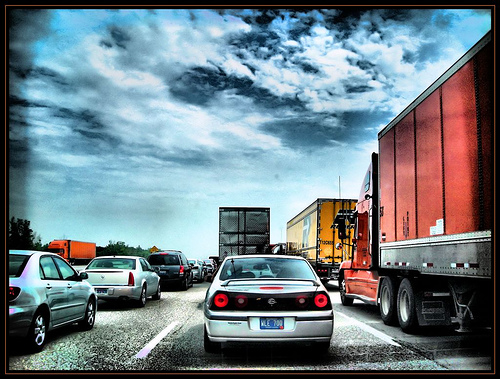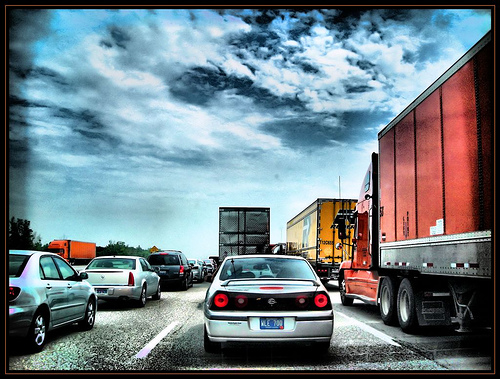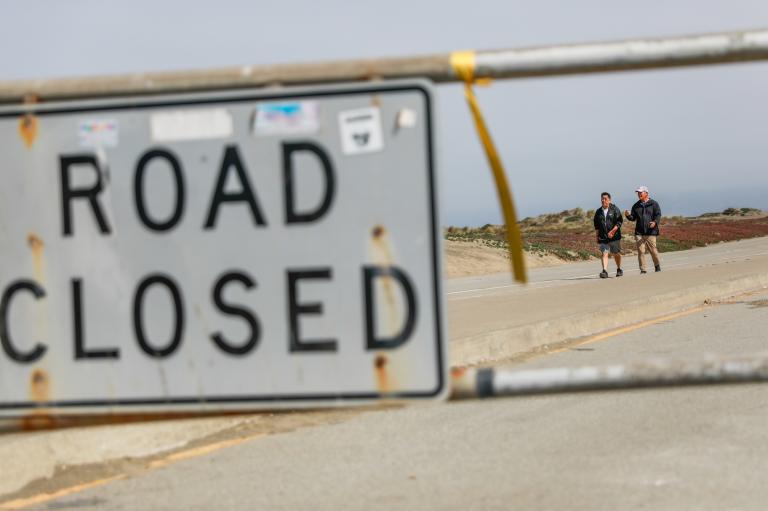 Photo: Kathy McEldowney
Photo: Kathy McEldowney
If you’ve spent any part of today sitting in traffic — not unlikely, if you live in a car-dependent part of the country — you might be encouraged to hear that we may have hit something called “peak travel” in industrialized nations.
That idea has been pinging hopefully around the blogosphere, after the release of a recent study that shows vehicle miles traveled have declined relative to GDP in the United States and seven other countries — and this was before the recession.
Possible reasons for the decline include bad traffic, parking headaches, an aging population, high gas prices, and a population that has as many vehicles as it can consume.
One of the study’s authors, Lee Schipper of the University of California, Berkeley, and Stanford University, suggested that this trend could mean projections for transportation-related carbon emissions in the developed world are too high. From an article on Miller-McCune:
“A major factor behind increasing energy use and carbon dioxide emissions since the 1970s has ceased its rise, at least for the time being,” Schipper said. “If it is a truly permanent change, then future projections of carbon dioxide emissions and fuel demand should be scaled back.”
Let’s say the study’s premises hold, and that people in countries like the United States simply have hit a wall on how many miles they can or want to drive.
The study does not address parts of the world that are not already saturated with car ownership. When asked about that by the Miller-McCune reporter, here’s what Schipper’s response was:
Traffic is paralyzed everywhere, and that will be an obstacle to motorization in the developing world in the end, Schipper said.
“My basic thesis is, ‘There ain’t room on the road,'” he said. “You can’t move in Jakarta or Bangkok or any large city in Latin America or in any city in the wealthy part of China. I think Manila takes the prize. Yes, fuel economy is really important, and yes, hybrid cars will help. But even a car that generates no CO2 still generates a traffic problem.
“Sadly, what is going to restrain car use the most is that you can’t move.”
But in fact, the insane traffic in places like Beijing hasn’t done anything to reduce demand for private motor vehicles. Only government restrictions on the number of new vehicle licenses available have been able to do that.
And in the short term, smaller cities in nations like China will continue to suck up cars at a fantastic rate — although not the annual increases of 25 percent that have prevailed in the past. From The New York Times:
“China will still achieve 8 to 10 percent growth in 2011 because most of the incremental car sales are coming from second- and third-tier cities where traffic congestion is not yet a major concern,” said Michael Dunne, an independent automotive analyst specializing in China.
Hey, I’m glad to hear that we may have hit the wall in vehicle miles traveled in the developed world. But the lifestyle model that we have created and marketed — that our own auto industry’s survival is predicated upon, and thus our economy’s — is based on increased consumption and use of motor vehicles by the billions of consumers who don’t yet have them in the developing world. How long will it take for those nations to hit that point of stagnation? And what will carbon levels be by then?
Hoping that the problem can be stopped by the traffic jam to end all traffic jams seems like hoping a human individual’s heart disease can be stopped by a heart attack.



